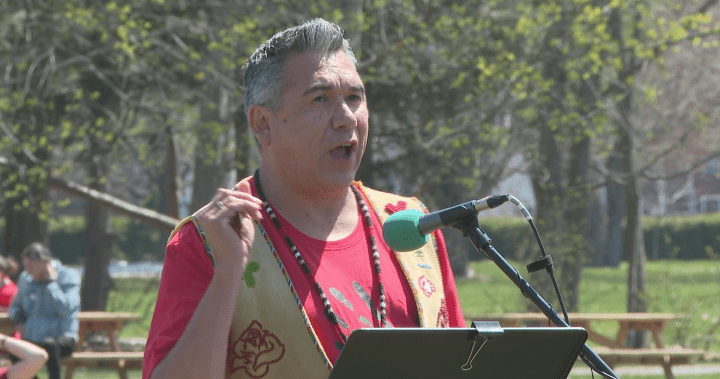Six chiefs of the Wolastoqey Nation in New Brunswick are calling for increased support from the provincial and federal governments to address issues surrounding the banishment of individuals from First Nations communities. This plea comes in the wake of the death of Sheri Sabattis on Oromocto First Nation in April, allegedly at the hands of a man who had been banished from the community. The chiefs, including Allan Polchies Jr., chief of St. Mary’s First Nation, are advocating for legislation and laws to address this issue, referring to the lack of support as systemic racism. They expressed frustration that their requests for support have been ignored by both levels of government.
The chiefs made their demands known during a Red Dress Day march in Fredericton, which aims to raise awareness of missing and murdered Indigenous women, girls, and two-spirit people. Sheri Sabattis’s nephew carried a picture of her during the march, highlighting the impact of her tragic death on her family and community. The chiefs emphasized the need for concrete action to address the issue of banishment within Indigenous communities, rather than temporary solutions. They called for laws to be passed that would provide a legal framework for enforcing the decisions made by First Nations councils regarding banishment.
Despite efforts to bring attention to this issue, the chiefs indicated that their requests for support have been met with silence from both the provincial and federal governments. They described the situation as a legal void, where existing laws are not being enforced or supported, leading to a lack of accountability for individuals who have been banished from their communities. The chiefs stressed that this lack of action perpetuates systemic racism, as Indigenous peoples continue to face barriers in accessing justice and protection within their own communities.
New Brunswick’s attorney general, Ted Flemming, did not respond to requests for an interview, indicating a lack of engagement from government officials on this pressing issue. Similarly, the New Brunswick RCMP declined an interview, instead issuing a statement emphasizing the complex nature of enforcing band council bylaws. The RCMP stated that they must work within legal parameters to ensure fair and just investigations, but did not address the specific concerns raised by the Wolastoqey chiefs regarding the enforcement of banishment decisions.
The chiefs’ calls for increased support highlight the need for a comprehensive and culturally sensitive approach to addressing issues within Indigenous communities, such as banishment. They stress the importance of developing legislation and laws that reflect the unique needs and challenges faced by Indigenous peoples, rather than relying on temporary or ineffective measures. The tragic death of Sheri Sabattis serves as a stark reminder of the consequences of inaction and the urgent need for meaningful change to protect and support Indigenous communities in New Brunswick and across Canada.
As the chiefs continue to advocate for greater support from government authorities, it is crucial that their voices are heard and their concerns are addressed to prevent further tragedies and injustices within Indigenous communities. The call for legislation and laws to address the issue of banishment reflects a broader push for meaningful action to address systemic racism and ensure the safety and well-being of Indigenous peoples in New Brunswick and beyond. It is imperative that the provincial and federal governments engage with the Wolastoqey Nation and work collaboratively to implement concrete solutions that uphold the rights and dignity of Indigenous peoples.













